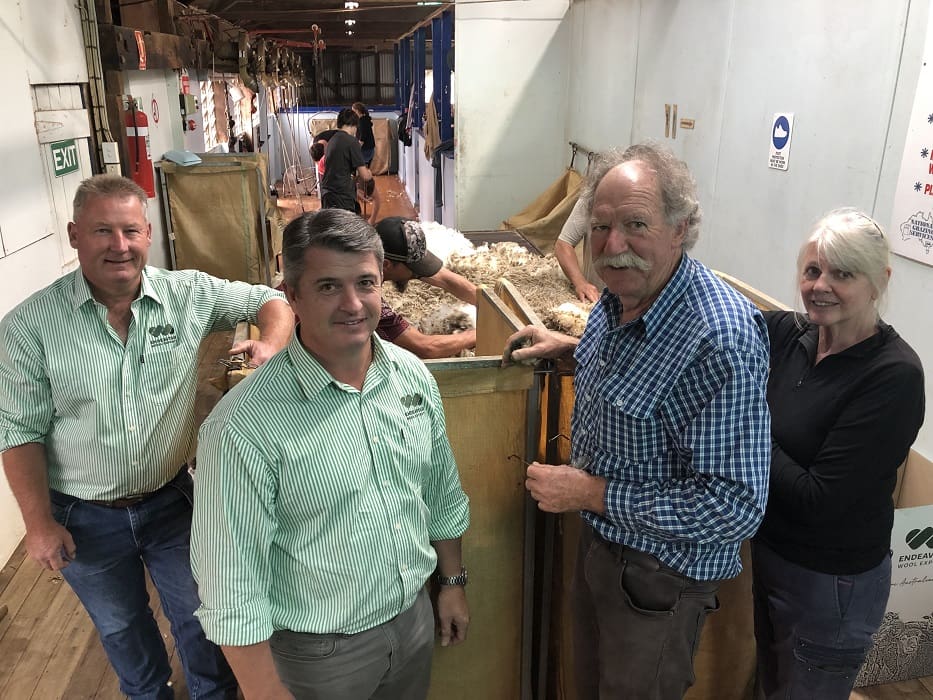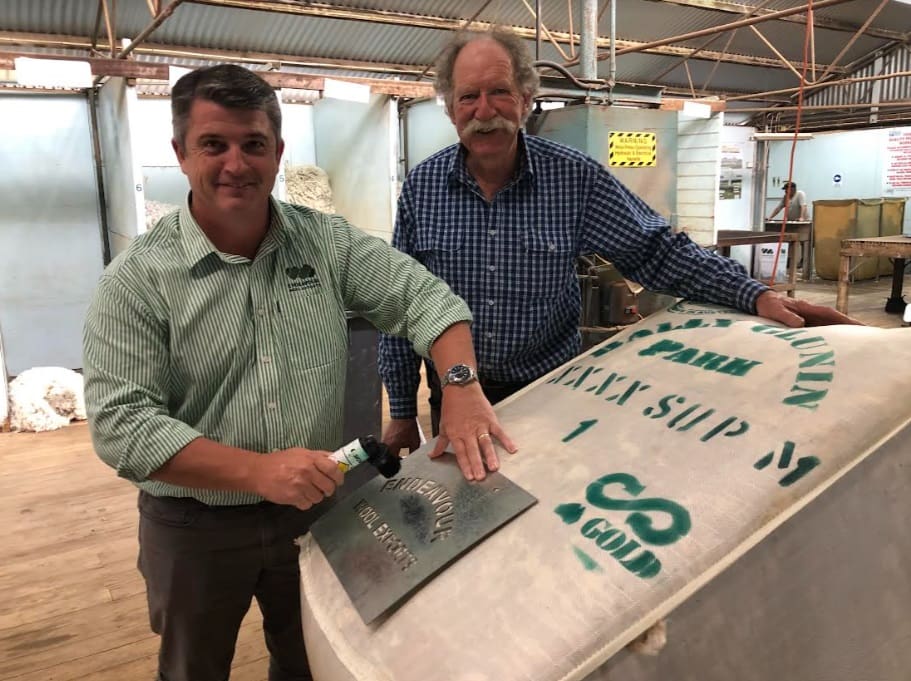
From left, EWE Hamilton wool manager Phil Schultz, EWE MD Josh Lamb, with Michael and Cathy Blake, watch the Bally Glunin Park clip come off this week.
HAMILTON wool growers Michael and Cathy Blake have moved to market their wool exclusively through an exporter/broker to help lift the global profile of the Australian-owned integrity scheme SustainaWOOL.
The Blakes’ non-mulesed Bally Glunin Park clip will be marketed through Endeavour Wool Exports with SustainaWOOL accreditation, rather than through their previous broker and the American-based Responsible Wool Standard.
Bally Glunin Park produces around 150-160 bales per shearing on an eight-monthly shearing cycle, so every three years they produce about 300 bales in a calendar or financial year, Mr Blake said.
The farm has been involved with SustainaWOOL from its inception in 2015, and attained Gold status in 2020. Mr Blake was involved with the early development of CattleCare, Flockcare, the GO MARK Company and Safety MAP, in the late 1990s. The farm currently operates under 10 separate quality assurance schemes, including SustainaWOOL Gold certification.
Mr Blake said they made the move partly because through SustainaWOOL and EWE the clip would be linked to another project with an Italian manufacturer.
“Over the last 25 years, I have been selling a portion of Bally Glunin Park wool through private treaties, originally through the Futures Trading, then with The Merino Company, and over the last 10 or so years with Reda contracts.
“So for us it won’t be a big step to market direct our entire clip.”
Mr Blake sees no downside for Australian growers in marketing their wool with an Australian-owned integrity certification rather than through an independent overseas-administered scheme such as RWS.
“No, not at all.
“It is very important that we control the parameters of the wool integrity vertification for the Australian wool clip; however, having said that, it is equally important that the ISO Auditor be an international company.”
Mr Blake said he couldn’t promote SustainaWOOL through his former broker Fox & Lillie, which is promoting RWS accreditation.
“I’m passionate about SustainaWOOL, I’ve been involved with it since its conception and a lot of our intellectual property went into each version of SustainaWOOL.
“I see it as a really simple tiered standard that people can come into at a level and work their way up through the different levels.”
Mr Blake said for him to have marketed his wool with RWS accreditation he would have to “perjure himself” on the integrity scheme’s declaration.
“Because we do things on the farm that are prohibited under RWS.
“This included selling male lambs that have reached puberty, but have been castrated, occasionally using baits for fox control and additional ear marks for program management, just to mention a few,” he said.
“I have met directly with RWS representatives at Bally Glunin Park on three occasions to get them to change the clauses, but to no avail.”
Mr Blake said SustainaWOOL is developed in Australia for Australian conditions and owned by the Australian Wool Exchange. The Australian wool industry needed just one integrity scheme, he said.
“But saying that, SustainaWOOL has to do more and have a wider focus … it has to sell itself globally much better than it does.
“This is what RWS does, they are very savvy and it’s my endeavour to promote SustainaWOOL globally.”
Mr Blake said there was an opportunity through SustainaWOOL to develop the relationship with Italian processors. He was also unsure whether the “tail might be wagging the dog” in regard to trade demand for RWS and there was a lack of continuity in price premiums for RWS accredited clips at auction to justify grower uptake.
Mr Blake said Bally Glunin Park was the first clip to have EWE’s stencil on its bales.
Endeavour Wool Exports steps into broking

EWE MD Josh Lamb brands his first Bally Glunin Park bale with Michael Blake.
EWE managing director Josh Lamb said the broking part of the business had not been promoted.
“EWE has been traditionally a private buyer of wool in the bush, but we would like to expand traditional brokering further.”
He said EWE was also doing the majority of Australian buying for the Italian fabric manufacturer Reda.
“Growers who are going down that path with SustainaWOOL, we are trying to link them more directly with processors.
“Reda has always been supportive of direct links to wool growers.”
Mr Lamb said the profile of SustainaWOOL in Australia is rising, but it could be improved globally, and the current unity with Australian industry bodies on traceability was aimed at helping that.
“We are trying to get AWI involved through Woolmark to get that pull through at the other end of the market with an Australian integrity scheme.
Eventually that may be SustainaWOOL or another incarnation of it,” he said.
“We’ve had discussions with the Italian Wool Trade Association, through Loro Piana, through Reda – they are all supportive of Australia coming up with its own certificate or its own scheme and this is the beginning of that.”
The European manufacturers would prefer to see all Australian wool accredited under the one integrity scheme and the Loro Piana Group as an example, won’t buy any wool for their textile division after 2025 that isn’t certified, he said.
“That’s the way the world is moving.
“Is China moving that way yet? No, it’s not, but it will follow eventually,” he said.
“There is a real appetite, particularly in Europe, to get away from RWS and get into an Australian scheme in Australia, and we are trying to help push that along as a company and for the betterment of the industry.
“This is the beginning of that.”
Mr Lamb said there is a huge opportunity for more Australian wool to be marketed with SustainaWOOL certification.
“RWS is putting itself out of the market a little bit with its complications, and the cost of it is going to suffocate growers from going into it.
“We need a standard that is built to Australian conditions and the things that we do well here that we don’t get credit for in an RWS scheme.”
Need for a simpler more cost-effective wool integrity scheme
As president of the Australian Council Wool Exports and Processors, Mr Lamb is working with brokers, the Australian Wool Exchange, Australian Wool Innovation and the AWTA on establishing a single traceability system for wool.
“We need a scheme that’s a lot simpler to be accredited and more cost-effective.
“We also need a scheme where the narrative is controlled by the industry here in Australia suiting Australian conditions,” he said.
“Textile Exchange has created an accreditation scheme to blanket the world as far as wool is concerned and we know that is not practical, and particularly for Australia.
“What’s made RWS successful is that it started at the other end of the chain where the demand is and that’s probably its biggest plus and retailers have picked up on it,” he said.
“But increasingly it has become more and more difficult to actually go through that system as a wool grower, but also as an exporter.
“It’s getting harder and harder, it is expensive and I don’t believe rewards are there for growers, brokers or exporters.”
In the long term, Mr Lamb said the Australian wool clip will have to be certified.
“Whether there is a price premium there or not, we are guaranteeing a product; it’s not about buying a certificate.”
Mr Lamb said a scheme created by Australia for Australian wool can only be an advantage and it will be independent regardless.
“Who knows our world leading product better than the passionate growers, exporters, brokers and service providers who handle it?
“End users of Australian wool want confidence in the raw material they buy that it is certified and has integrity,” he said.
“An Australian scheme tailored for the Australian industry with downstream support has the longer-term potential to put distance between our clip and other wool producing nations, that’s the motivation.”
Customer enquiries about SustainaWOOL have increased
AWEX chief executive officer Mark Grave said over the last 12-18 months, enquiry about SustainaWOOL from customers of Australian wool has definitely increased.
“All have said that they want to see an Australian owned integrity scheme that understands the wool industry and how it operates.
“What draws them to SustainaWOOL is: SustainaWOOL is owned by the Australian industry, quality and integrity are central to the scheme,” he said.
“All are seeking a simple and cost effective scheme that meets their needs, is easy to work with and carries the level of integrity that has been the hallmark of the Australian wool industry.
“We recognise that better and increasing promotion of SustainaWOOL through the supply chain is required,” Mr Grave said.
“In 2022, SustainaWOOL engaged a representative based in China to build on the relationships with our China partners and to lift SustainaWOOL’s profile in an important market for Australian wool.
“SustainaWOOL will continue to work with partners and organisations by supporting them and their customer networks in key markets,” he said.
“We are proud of our SustainaWOOL members and the passion they have for quality, integrity and sustainability of Australian wool.
“Michael and Cathy Blake exemplify this passion, understand the value of building relationships through the value chain and have a strong record of engaging with industry and pushing boundaries.”

Michael and Cathy Blake’s decision to market all their non-mulesed Merino wool with SustainaWOOL accreditation is an important milestone for Australia’s on-farm wool quality assurance. That’s because the Blakes have been involved in developing, advising and implementing a range of on-farm QA programs for more than 30 years. Their knowledge of what constitutes an effective on-farm QA program; be it for a commodity like wool or meat, for environment enhancement, or social responsibility such as staff safety, is second to none. Michael comments about the lack of applicability of Responsible Wool Standard (RWS) accreditation and Textile Exchange’s incapacity to account for particular situations has become more apparent as the organisation’s popularity amongst retailers has grown. Textile Exchange seems to be aligning the RWS with ideologies that corporates like to associate themselves with and which are often at odds with the holistic complexities involved in livestock farming in highly variable environments. Its 2022 report “Regenerative Agriculture Landscape Analysis” suggests to companies buying natural fibres that they encourage farmers to transition to regenerative agriculture and that “ultimately, organic and regenerative should not be considered as competing concepts — there is much that unites them, and both movements can build on and learn from one another along their shared path to achieving equitable and restorative agricultural systems.” Textile Exchange’s narrowing farming method focus is likely to have implications for RWS accreditation and could often be at odds with practical QA on Australian sheep farms. It highlights why SustainaWOOL accreditation developed under Australian conditions needs widespread Merino farmer support to achieve global recognition among natural fibre textile and clothing manufacturers.